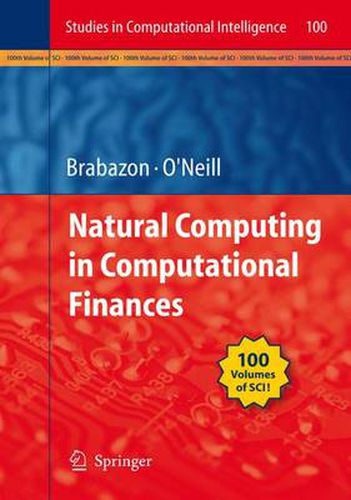Readings Newsletter
Become a Readings Member to make your shopping experience even easier.
Sign in or sign up for free!
You’re not far away from qualifying for FREE standard shipping within Australia
You’ve qualified for FREE standard shipping within Australia
The cart is loading…






This title is printed to order. This book may have been self-published. If so, we cannot guarantee the quality of the content. In the main most books will have gone through the editing process however some may not. We therefore suggest that you be aware of this before ordering this book. If in doubt check either the author or publisher’s details as we are unable to accept any returns unless they are faulty. Please contact us if you have any questions.
Natural Computing in Computational Finance is a innovative volume containing fifteen chapters which illustrate cutting-edge applications of natural computing or agent-based modeling in modern computational finance. Following an introductory chapter the book is organized into three sections. The first section deals with optimization applications of natural computing demonstrating the application of a broad range of algorithms including, genetic algorithms, differential evolution, evolution strategies, quantum-inspired evolutionary algorithms and bacterial foraging algorithms to multiple financial applications including portfolio optimization, fund allocation and asset pricing. The second section explores the use of natural computing methodologies such as genetic programming, neural network hybrids and fuzzy-evolutionary hybrids for model induction in order to construct market trading, credit scoring and market prediction systems. The final section illustrates a range of agent-based applications including the modeling of payment card and financial markets. Each chapter provides an introduction to the relevant natural computing methodology as well as providing a clear description of the financial application addressed.
The book was written to be accessible to a wide audience and should be of interest to practitioners, academics and students, in the fields of both natural computing and finance.
$9.00 standard shipping within Australia
FREE standard shipping within Australia for orders over $100.00
Express & International shipping calculated at checkout
This title is printed to order. This book may have been self-published. If so, we cannot guarantee the quality of the content. In the main most books will have gone through the editing process however some may not. We therefore suggest that you be aware of this before ordering this book. If in doubt check either the author or publisher’s details as we are unable to accept any returns unless they are faulty. Please contact us if you have any questions.
Natural Computing in Computational Finance is a innovative volume containing fifteen chapters which illustrate cutting-edge applications of natural computing or agent-based modeling in modern computational finance. Following an introductory chapter the book is organized into three sections. The first section deals with optimization applications of natural computing demonstrating the application of a broad range of algorithms including, genetic algorithms, differential evolution, evolution strategies, quantum-inspired evolutionary algorithms and bacterial foraging algorithms to multiple financial applications including portfolio optimization, fund allocation and asset pricing. The second section explores the use of natural computing methodologies such as genetic programming, neural network hybrids and fuzzy-evolutionary hybrids for model induction in order to construct market trading, credit scoring and market prediction systems. The final section illustrates a range of agent-based applications including the modeling of payment card and financial markets. Each chapter provides an introduction to the relevant natural computing methodology as well as providing a clear description of the financial application addressed.
The book was written to be accessible to a wide audience and should be of interest to practitioners, academics and students, in the fields of both natural computing and finance.